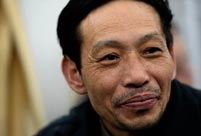 Int'l Snow Sculpture Art Expo in Harbin
Int'l Snow Sculpture Art Expo in Harbin Sichuan money wall for dividend payment
Sichuan money wall for dividend payment Li Na crashes Belinda Bencic in 2nd round at Australian Open
Li Na crashes Belinda Bencic in 2nd round at Australian Open
 Shocking moments when PLA's weapons open fire
Shocking moments when PLA's weapons open fire Famous Lanzhou beef noodles
Famous Lanzhou beef noodles Armed Police hold anti-terrorism drill in SE China's Xiamen
Armed Police hold anti-terrorism drill in SE China's Xiamen Harbin Int'l Ice and Snow Festival opens
Harbin Int'l Ice and Snow Festival opens 'Jin' named the word of the year by cross-strait netizens
'Jin' named the word of the year by cross-strait netizens Chinese scientific expedition goes to build new Antarctica station
Chinese scientific expedition goes to build new Antarctica station
Testing the waters
2011 saw a rise in the number of Taiwan politicians testing the waters of Weibo. However, most of them have either disappeared or lost their influence in the last two years.
Compared with Chiu, the Weibo accounts of his political enemy Hong Zhikun have been off the radar for over a year after he reopened dozens of new Weibo accounts under different names.
Insiders said that his outspoken comments attacking the political system of the mainland and promoting Taiwan independence may have offended the authorities.
Hong Zhikun, a rising star in the DPP, opened his Weibo accounts in order to "listen and record."
"I want to know what has been happening in the mainland, and what people are thinking about," Hong told the Global Times in an e-mail reply.
Even in high school, Hong was active in the community and showed great enthusiasm for political and social issues.
In fact, Hong has been trying many ways to communicate with grass-roots people.
His first connection with the mainland started back in college when he was asked to receive scholars and professors from the mainland.
However, he found that the scholars' "rigid concepts" helped little to enhance understanding across the strait.
He began to seek other ways to learn about the mainland.
Eventually, he opened a Weibo account. Promoting his party's proposals is one of his goals. In many of his Weibo posts, he wrote "The DPP is more concerned about the livelihood of grass-roots people than the KMT."
Hong said Weibo opened a new window for him. He began to realize youngsters on the mainland were interested in the Taiwan elections.
"There are the same severe social problems that the Chinese mainlanders are now facing: corruption, social conflicts and censorship. I believe we can introduce some experience on these topics," Hong said.
Hong would spare two hours every weekend replying to Net users' questions. Taiwan's political system, cross-Straits relations and cultural and social differences were the usual topics. Sometimes, their talks would include discussions on sensitive issues. Once, a high school student said he was hesitating about whether or not to join the Communist Party of China (CPC) and asked Hong for advice. Hong suggested he "firstly get well-off."
Last June, he posted on Weibo that he "came to Beijing to visit human rights lawyers and had a fierce discussion about democracy, human rights and other problems…Those people are among the minority of people I visited and can be exposed publicly." He also tagged them in his group photos.
Still, Hong said he is not against the mainland government.
"People on both sides hold totally different life values, and I simply see it as a difference in choosing how to live their lives," Hong told Phoenix Weekly.
Critics say Taiwan politicians entering the mainland Internet scene are merely seeking to make political gains back in the island, but they do contribute to cross-Straits communication and understanding.
Compared with the total population of mainland Net users, the number of people following Taiwan politicians on Weibo is not large. However, they have amassed an increasing fan base of those who are interested in knowing how Taiwan's fledgling democracy works.
Hong has had a fierce reception from Weibo users with starkly different opinions of him. Many of the netizens see him as representing the separatist forces of Taiwan, while clearly he has successfully established his own fan base among liberals.
Both Chiu and Hong, despite their sometimes conflicting political views, have offered rare chances for mainland Net users to directly communicate with politicians from Taiwan, and importantly, provided a window for them to get to know Taiwan, said Li Fei.
However, such an aggressive stance, such as the one taken by Hong, is obviously not welcomed by the mainland authorities, which is why Hong's Weibo accounts have been shut down multiple times. It's still far from certain that one of his Weibo accounts can ever be verified, like Chiu's has.

 A 60-hour journey home
A 60-hour journey home Int'l Snow Sculpture Art Expo
Int'l Snow Sculpture Art Expo Highlights of China's air force
Highlights of China's air force Airline crew stage flashmob dance at Kunming airport
Airline crew stage flashmob dance at Kunming airport Top15 countries to retire to in 2014
Top15 countries to retire to in 2014 Hot supermodel's new photo album released
Hot supermodel's new photo album released Asia's heaviest box girder finishes 'rotation' in Wuhan
Asia's heaviest box girder finishes 'rotation' in Wuhan Completed facade of People's Daily new headquarters
Completed facade of People's Daily new headquarters Chinese-branded car passes North America standard safety test for the first time
Chinese-branded car passes North America standard safety test for the first time Li Na beats Bouchard to reach Australian final
Li Na beats Bouchard to reach Australian final  Explore the sources of PM 2.5
Explore the sources of PM 2.5 Highlights of Chinese airborne troops'exercises
Highlights of Chinese airborne troops'exercises  'Living in ice house' competition held in central China
'Living in ice house' competition held in central China  Chinese figure in Oscar nominations
Chinese figure in Oscar nominations  Top ten aerospace events in China 2013
Top ten aerospace events in China 2013Day|Week|Month